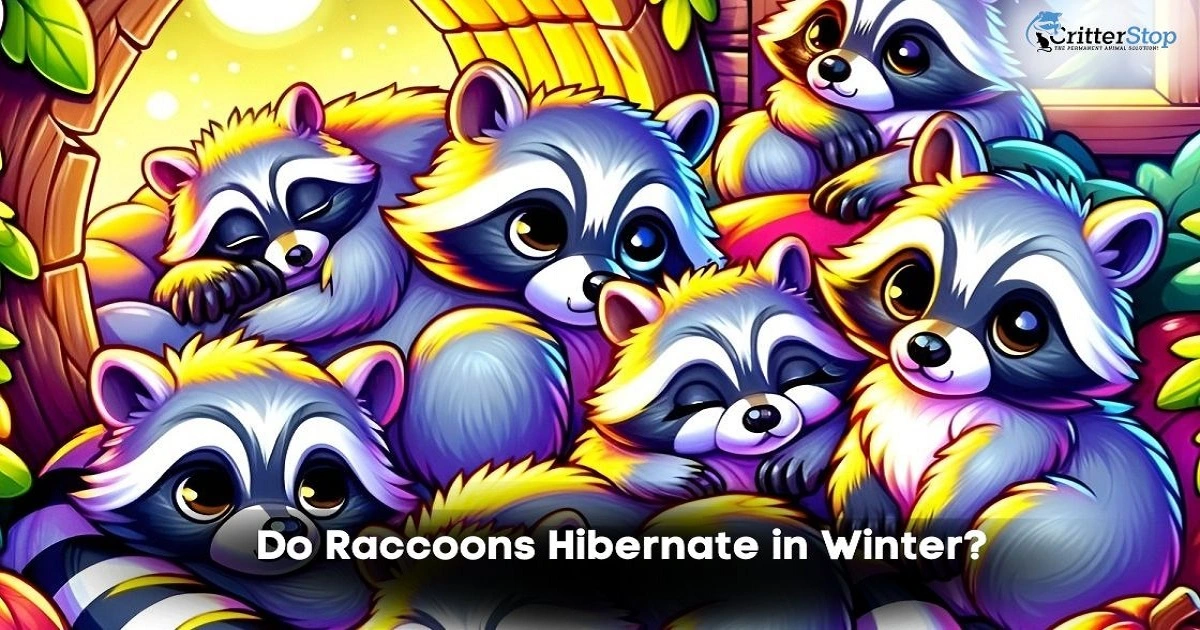
Hey there, curious minds! Today, we're diving into the chilly world of raccoon winter behavior—it's like a cozy mystery novel starring our furry friends! Many people pose the question: Do raccoons hibernate? You might wonder why we should care about raccoon antics in the cold. Well, my friend, buckle up because understanding their winter habits is like unlocking a secret raccoon treasure map!
Now, let's meet our main characters: the baby raccoons again! These critters are like little masked bandits with a knack for survival. Imagine a fluffy body with a distinct black "mask" around its eyes – talk about a fashion statement!
When winter comes a-knockin', raccoons show off their genius side to sustain themselves and keep optimal body temperature. They might look like they're just wandering around, but these creatures are tactical geniuses in their own right, even if a large portion of their beings is just pure body fat. Whether it's raiding trash and garbage cans or devising elaborate escape routes, raccoons are the MacGyvers of the animal kingdom.
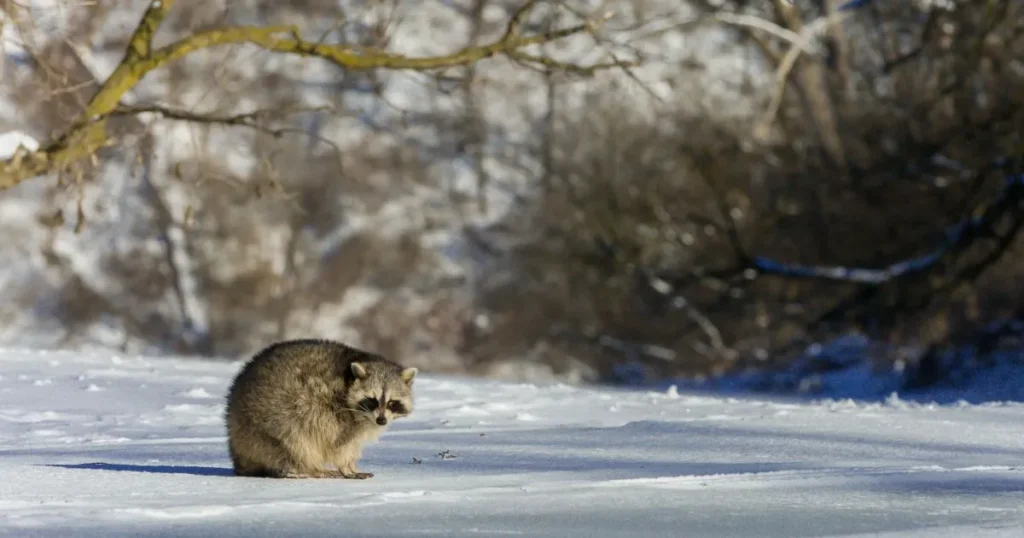
Picture this: raccoons are about the size of a small dog, with a bushy tail practically made for wagging. Their fur coat? Well, let's just say winter fashion is their forte – it's thick, cozy, and ready to tackle even the chilliest days; their body fat can be plentiful, depending on the station. And oh, that mask around their eyes? It's not just for looks; it's like their superhero disguise, helping them sneak around like raccoon ninjas!
Alright, let's get into the nitty-gritty of raccoon behavior. These critters are the ultimate party animals—they're active during the night (so, sorry, no daytime tea parties for them!). When winter knocks on the door, raccoons don't just curl up, conserve energy, and wait for spring; unlike wild animals, they roll up their sleeves (or fur) and put their resourcefulness to the test.
It's freezing out there, and food isn't exactly falling from the sky. But fear not, because raccoons have mastered the art of scavenging. Trash cans? Consider them raided. Fallen fruits? Yep, they're gobbled up, and raccoons eat them, too. These little explorers aren't afraid to take a chance on unusual snacks; they'll take everything, even the dog food you leave outside for your pet.
But the real showstopper for wild animals? Their hibernation habits. Nope, they're not just sleeping the winter away in tree cavities. While some raccoons might catch a few Z's, others are out and about, hunting for sustenance like a raccoon-sized game of hide-and-seek.
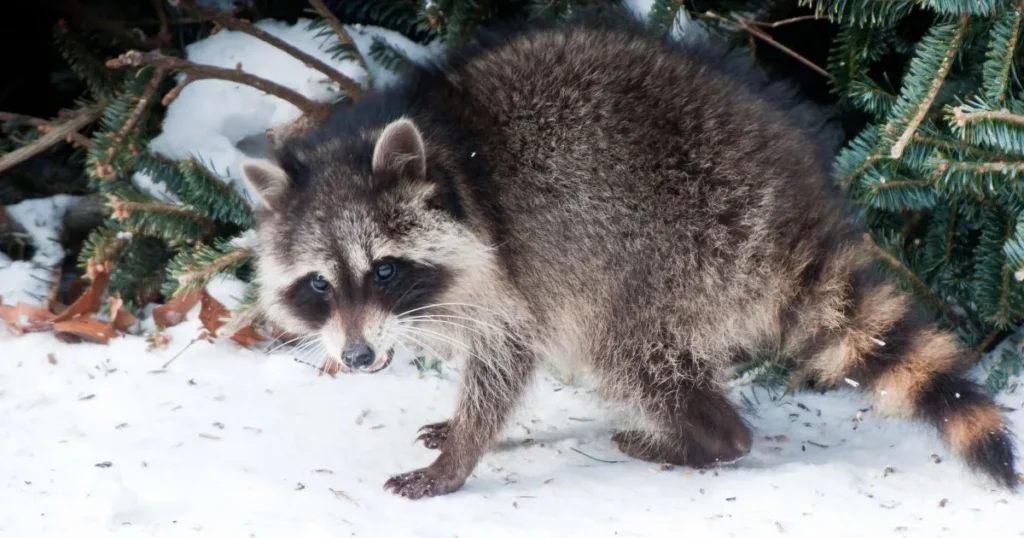
Alright, cozy companions. Now it's time to unravel the raccoon winter wonderland! Imagine a snowy landscape where our masked adventurers are on a mission—let's take a closer look.
When winter wraps its chilly arms around us, raccoons don't exactly retreat to a winter wonderland spa. No sir! These determined critters are on the move. They might not be skiing down slopes, but they're definitely up to something. You see, raccoons have this amazing ability called "diurnal torpor." It's like their version of hitting snooze on a cold winter morning.
Hold on tight because we're about to explore some raccoon science! While they might not throw on pajamas and snuggle into a cozy den for months, raccoons have a neat trick. Torpor is like their winter power nap. Instead of the full-on hibernation mode, where heart rates plummet, and it's lights out for weeks, torpor is a light nap where raccoons live while their body temperature and metabolic rate take a temporary dive. Think of it as a raccoon siesta – they're conserving energy but not completely dozing off.
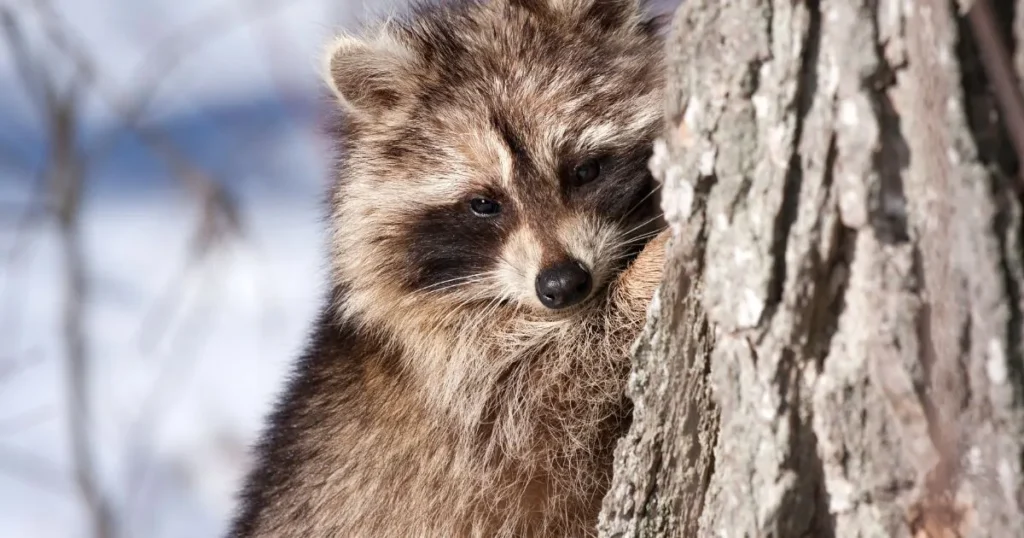
Time to clear up some raccoon myths, pals! You might have heard that raccoons sleep through winter like bears in a cave, but that's not entirely true. At Critter Stop, we have to deal with thousands of raccoons every winter, so we know some false-myth that we want to share with you:
When we have provided removal raccoon services, we have noticed that raccoons don't go full-on "Rip Van Winkle" during winter. They're not tucked away in a cozy den, dreaming of warmer days. Nope, they're too busy living their raccoon lives—foraging, exploring, and trying to outsmart any bird feeders that stand in their way.
You might have heard the rumor mill spinning tales of raccoon hibernation. But don't worry—you're not alone—lots of folks think raccoons are snuggled up in a furry ball of sleep all winter long. Blame it on their slow winter movements, body temperatures, and knack for hiding in warm spots. While they may be less active, what appears to be a hibernating raccoon is likely just a raccoon that doesn’t enjoy the cold weather any more than we do!
Raccoons are omnivorous, meaning they eat both plants and animals. In the winter, their diet can vary depending on their location and what is available, but it generally includes fruits, nuts, berries, and acorns. They can also eat small mammals, bird eggs, insects, and even birds. Raccoons can eat everything during winter.
Now, let's talk about where these nocturnal explorers crash after a busy winter night. Raccoons might not be holed up in a cave but prefer a snug hideaway. That could be a cozy tree hollow, a crevice in a rock, or even a well-hidden spot that allows them to enter your attic (oops!).
So, to sum it up, while raccoons don't exactly hibernate like bears in a fairy tale, they're not couch potatoes, either. Torpor keeps their engines running at a low hum, and their winter sleep spots are like secret hideouts where they catch some Z's before their next adventure.
Unfortunately for many of our customers, the answer to “Where do raccoons live in winter?” is often in residential attics, where they can stay safe and warm like it was their own house.
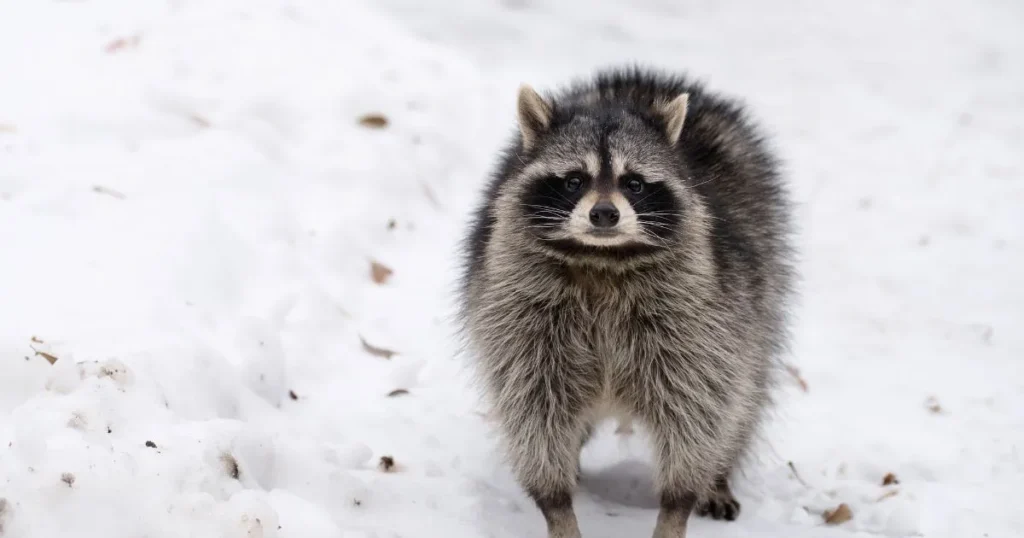
As wildlife removal experts, at Critter Stop, we know how to identify some signs that could help you know if you have raccoons spending the winter in your attic:
Hey there, curious winter explorers! Now that we've cracked open the raccoon playbook, let's delve into their cozy habitats and gourmet winter diets.
Imagine it's a frosty morning, and you're not really in the mood for a big breakfast – you just want a snack to keep you going. Well, raccoons get that feeling too! During winter, their food options might be slimmer than a snowflake, but these cunning critters know how to make the most of it. They're like the culinary adventurers of the animal kingdom, scavenging for everything from fallen fruits human food scraps to hidden nuts.
Just like you wouldn't want to sleep outside in the cold, raccoons also seek shelter. But they're not reserving a suite at the Raccoon Ritz-Carlton! Nope, they're all about finding the coziest nooks and crannies. Tree hollows, abandoned burrows, and even the eaves of abandoned buildings – these are the spots raccoons transform into their winter hideaways. They're basically the kings and queens of home improvement, decking out their shelters with leaves, twigs, and other insulating materials to create their own little winter retreats.
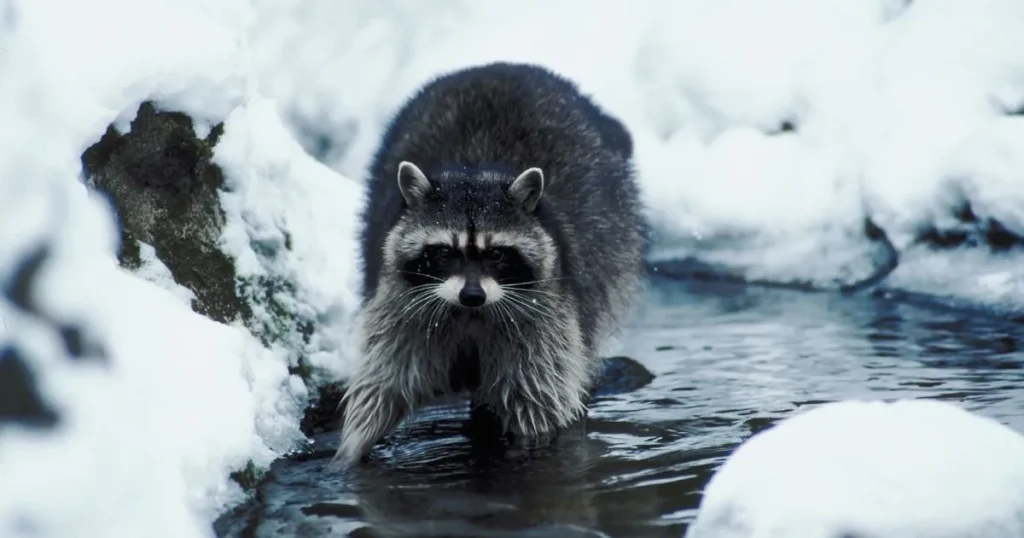
As we wrap up our raccoon winter adventure, let's dive into some other animals and cozy human-wildlife encounters with our furry friends.
Winter might bring a snowflake-filled wonderland, but it can also bring some uninvited guests – raccoons! These crafty critters are on a mission to find warmth and food, and unfortunately, sometimes that means your cozy home becomes their crash pad. From rummaging through trash cans for pet food to making themselves at home in your attic, raccoons can leave their mark on your property.
Imagine stepping outside and stumbling upon a raccoon den in your backyard – talk about a wildlife surprise party! So, what's the plan? First things first, keep your cool. Raccoons aren't there to play pranks; they're just seeking shelter. If you find a raccoon mating season den, it's best to leave it alone and give them their space. These critters are temporary guests, and once winter's chill fades, they'll move on to their next adventure.
Alright, raccoon aficionados, we've journeyed through the frosty world of raccoon winter behavior, and what a ride it's been! Let's do a quick recap: raccoons might not be winter's version of Sleeping Beauty, but they're definitely not lazy couch potatoes either. Their torpor power naps and strategic shelters keep them going strong during chilly times in colder climates. They're like the wildlife version of winter warriors – ready to take on any challenge Mother Nature throws their way.
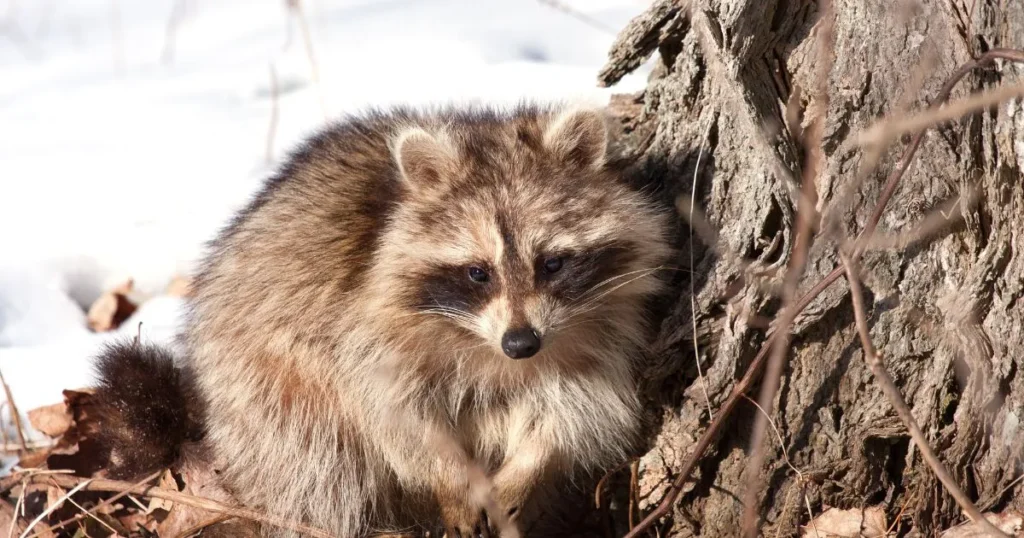
Why does all this raccoon behavior matter to us humans? Well, it's all about coexisting harmoniously with our wild neighbors. By understanding raccoon habits, we can learn how to peacefully share our spaces without causing undue stress for these creatures.
If they choose a winter vacation at your home and you don't want any guesses, call us at (214) 234-2616 right now. We have provided raccoon removal services in Texas. We can help you to put the situation under your control. In Critter Stop we are ready to pick up your call.
Raccoons are a common sight throughout North Texas, but their behavior changes significantly during winter. Unlike some animals, raccoons do not hibernate. However, they have developed unique strategies to survive the cold, food-scarce months. Below are answers to some of the most frequently asked questions about how raccoons adapt to winter conditions.
Raccoons rely on dens in tree cavities, attics, or abandoned burrows to stay warm. They grow a thick layer of fat during the fall, which helps insulate them during cold spells. Additionally, raccoons conserve energy by limiting their activity during extreme cold.
Raccoons stockpile body fat in the months leading up to winter, which allows them to survive when food is scarce. They also reduce their activity and may venture out only on warmer days to find food, relying on their keen scavenging skills to find anything edible.
No, raccoons reduce their activity significantly in the winter. They do not hibernate, but they will stay in their dens during colder periods. You may only see them during brief warmer spells when they search for food.
When temperatures drop, raccoons take shelter in dens. These dens can be found in hollow trees, under decks, attics, or other secure, warm places. They often seek out spaces that provide insulation from the cold.
Raccoons adapt by growing thicker fur and gaining extra weight during the fall. Their dens provide shelter, and they stay inside during particularly harsh conditions. They may also forage for food less often to conserve energy.
Raccoons do not hibernate but enter a state of reduced activity. They remain dormant in their dens during extremely cold weather and come out only during warmer periods to search for food.
Raccoons find shelter in dens in trees, buildings, or attics. They look for secure, insulated spaces that protect them from predators and freezing temperatures.
Raccoons will venture out on warmer days, even in the winter. They use these brief opportunities to forage for food, though they typically stay hidden when temperatures drop significantly.
Raccoons rely on their ability to scavenge various food, including anything they can find in trash or gardens. They also use stored body fat for energy and conserve energy by reducing their movement.
Raccoons stay hidden during colder periods but come out on warmer days to search for food. Their foraging decreases significantly in the winter, allowing them to conserve energy.
Raccoons bulk up in the fall, putting on fat reserves that provide energy during the winter. They minimize movement and conserve energy by staying in their dens most of the time.
In snowy conditions, raccoons rely on the fat stored in their bodies and the warmth of their dens. They will venture out only occasionally to forage, digging through snow to find food.
Raccoons find secure dens to avoid predators and the cold. These dens can be in trees, under homes, or in attics. When the weather is harsh, raccoons stay in these dens for long periods.
Unlike animals that hibernate, raccoons remain semi-active throughout the winter. They rely on their ability to find food during brief warmer spells, while their thick fur and stored fat help them survive colder periods.
Visit our Critter Library and learn more about our furry friends







